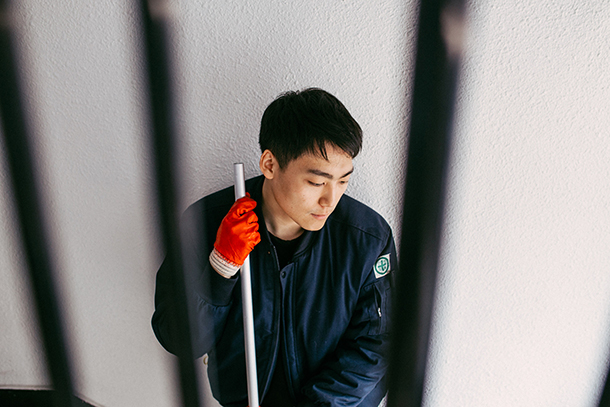- 15 May 2015
- [International Secretariat]
- Region: REPUBLIC OF KOREA
- Topic:

In South Korea, men who refuse to undergo compulsory military service are tried in civil courts for violation of the, Military Services Act. @Amnesty International / Photo: Kim Yonggi
South Korean authorities must end the needless imprisonment of hundreds of young men who object to military service on the grounds of conscience, Amnesty International said in a new report published today. Sentenced to Life, details the harsh consequences for South Korean men jailed for rejecting military service because they refuse to bear arms.
In an environment of heightened tension between South and North Korea, military service remains compulsory for South Korean men and most are conscripted in their early 20s. Terms of active service range from 21 to 24 months, and once completed the men are required to serve in the reserve forces for eight years, with a maximum of 160 hours of duty per year.
The government maintains that introducing an alternative service for conscientious objectors would jeopardize national security and undermine social cohesion – grounds that have been repeatedly rejected by UN bodies.
Imprisoned and fined
South Korea imprisons more people for their conscientious objection to military service than the rest of the world put together, with at least 600 men mostly aged between 20 and 24 currently in jail. Most object to military service on religious or pacifist grounds.
Those who refuse initial military service can face up to three years imprisonment. Those who decline to serve in the reserve forces can also face heavy fines.
Hostility and hardship
For many, the prison terms and punitive fines are only the beginning of their ordeal. Military service is seen as a “patriotic duty” by mainstream society due to the security situation in the Korean peninsula. Men who do not fulfil this duty are often considered to be traitors.
In an increasingly difficult economic climate for young job-seekers, conscientious objectors are punished twice as they are often denied employment due to their criminal record.
Many government-linked organizations will not employ conscientious objectors because of they have a criminal record, and major private companies generally require applicants to provide details of their military service during the recruitment process.
A chance to serve
The absence of a genuine alternative to military service denies young South Korean men the chance to serve their country.
In 2007, the Ministry of Defence in South Korea announced plans to introduce alternative service for conscientious objectors by 2009. However, following the February 2008 Presidential election, the government announced the plans had been put on hold indefinitely, citing lack of public support.
Under international law, every person has the right to refuse military service for reasons of conscience or profound personal conviction, without suffering any legal or other penalty.
Amnesty International is calling on the South Korean government to:
- Make provision for conscientious objectors to carry out an appropriate alternative non-punitive service of a genuinely civilian character.
- Immediately and unconditionally release all individuals imprisoned solely for refusing military service on grounds of conscience.
- Clear the criminal records and provide adequate compensation to all conscientious objectors.
13 May 2015
AMNESTY INTERNATIONAL PRESS RELEASE
Related Actions
Related Newses
- 27 Nov 2019 [International Secretariat]
REPUBLIC OF KOREA: Lawmakers should reject shameful anti-LGBTI amendment - 24 Jul 2019 [International Secretariat]
REPUBLIC OF KOREA: Criminalization of sex between men in military fuels violence, abuse and discrimination - 31 May 2017 [International Secretariat]
REPUBLIC OF KOREA: Soldier convicted in outrageous military gay witch-hunt - 16 Dec 2016 [International Secretariat]
REPUBLIC OF KOREA: New blow for right to peaceful protest as appeal court upholds conviction of trade union leader - 22 Oct 2016 [International Secretariat]
REPUBLIC OF KOREA: Appeal court victory for conscientious objectors




